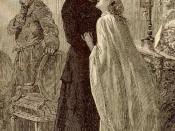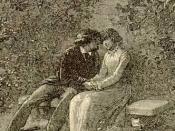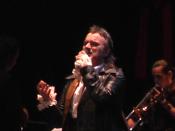Literature has been said to reflect man-kind, therefore themes within literature would also reflect on man-kind. A major characteristic of literature is theme because it is the only device that is developed from the beginning to the end of the novel. M. A. Abrams defines theme as ÃÂsometimes used interchangeably with motif, but the term is more usefully applied to a thesis or doctrine, which an imaginative work is designed to incorporate and make persuasive to the readerÃÂ ( 237). In the novel Les Miserables by Victor Hugo, a major theme is ÃÂIllusion v. RealityÃÂ. Jean Valjean, the protagonist in Les Miserables changes himself multiple times to hide his true identity from society. The theme of ÃÂIllusion v. RealityÃÂ is personified in the character Jean Valjean in the classic novel, Les Miserables by Victor Hugo.
Jean Valjean is the product of the society he lived in, both in terms of the suffering that led to him stealing a loaf of bread, and the excessive sentence he received as punishment for his "crime".
The scholar Stuart Fernie feels that Jean Valjean went into prison a simple and devoted brother and uncle, and left it filled with despair, hopelessness, bitterness and anger at the injustice of his treatment (Fernie 1). He has also become accustomed to doing whatever is necessary to survive and has little thought of dignity and principle. According to the Penguin-Putnam Books Les Miserables Reading Guide, ÃÂJean Valjean [was] in exile from the world of men because of the desperatecrime he committed when he was younger. Freed from prison, Valjean hides his identity and becomes a successful man, as charitable as he is rich and powerfulÃÂ (Les Miserables Reading Guide 2). Jean Valjean feels that he has done no wrong, and that he was only helping...


